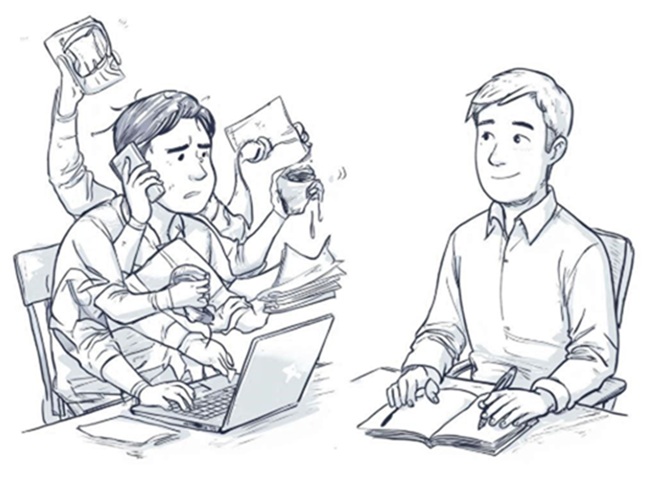Feb 22, 2026
Feb 22, 2026
by Sujata C
When the IT revolution stormed in during the 1990s, the buzzword was multitasking. The newly minted IT professional was expected to juggle emails, client calls, code and coffee – all at once. The faster you were, the sharper you appeared. Efficiency was measured not by depth but by speed. Open-plan offices buzzed with activity, and “time management” meant packing as much as possible into every minute. We were all told that doing three things at once made us smarter, more valuable, more “with it.” Those who were still using snail mail instead of emails were laughed at for being out-dated. Really!
Young turks would advise their moms to multitask. And moms would retort “But I have been doing that since ages. Even your grandmother was.” She was right, humans juggling multiple tasks has been practiced throughout history. Juggler and acrobats have existed as entertainers and performers in several civilizations.
Coming back to the present, we tried to multitask all through the first decade of the 21st century. Then the corporate mantra flipped on its head. The same industry that glorified busyness started eulogizing mindfulness. Now CEOs attend meditation retreats. Tech giants design apps that track screen time and encourage “digital detox.” Suddenly, the emphasis is on slowing down, on being “present,” on single-tasking. The culture that once celebrated the multitasking maverick now champions the mindful minimalist.

What changed? Science, for one. Research over the years revealed that multitasking doesn’t make us more productive – it is actually counter-productive, it makes us scattered. Switching between tasks drains cognitive energy and leaves us more prone to errors. Our attention spans shrank, stress levels rose, and burnout became the new workplace epidemic. Somewhere in the race for speed, we forgot the simple art of focus.
The pendulum has swung toward balance. Now, the conversation is about quality over quantity, attention over acceleration. Workplaces are introducing “focus hours” where emails are paused and meetings minimized. Yoga and meditation are no longer fringe pursuits; they’re mainstream tools for emotional resilience; even productivity experts now whisper the once-taboo word – pause.
Countless stories can be found on people leaving high paying tech jobs to pursue relaxed careers. The tech industry is notorious for long hours, tight deadlines, and an "always-on" culture, leading to chronic stress, burnout and exhaustion. The pressure is unsustainable and many switch to less demanding roles for their mental and physical well-being.
It’s a fascinating turnaround. The same digital revolution that fractured our attention is now teaching us to reclaim it. Perhaps this is evolution in disguise – a necessary correction after the excesses of speed. After all, progress isn’t always about doing more; sometimes it’s about doing better.
We began the 90s believing that multitasking would make work more efficient. Decades later, we’re discovering that presence makes life more meaningful. From chasing deadlines to cherishing moments, we’ve come full circle. The future of work – and perhaps of living – belongs not to those who can do many things at once, but to those who can do one thing well, with full awareness.
Illustration by the author using Microsoft Designer.
08-Nov-2025
More by : Sujata C